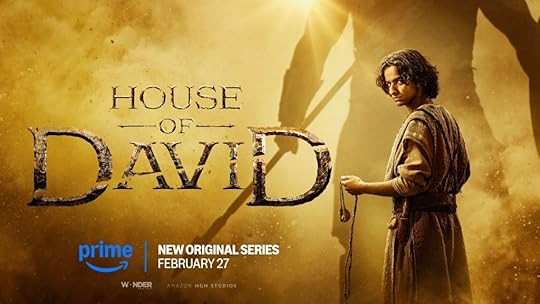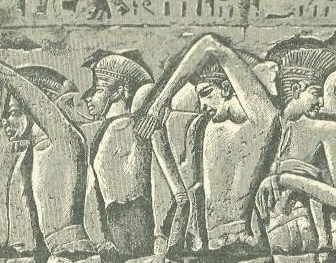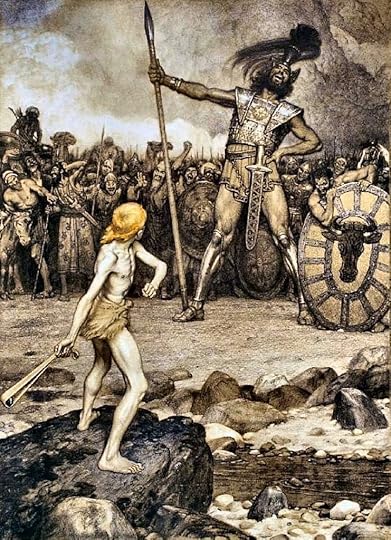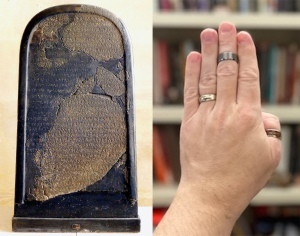The House of David, Episode 1 Review

The new show House of David is out on Amazon Prime (here’s the trailer), and I’ll give you an honest review of the first episode. I’m a Bible professor at Faulkner University in Montgomery, AL, and I teach undergraduate and graduate-level courses on the Hebrew Bible and historical books specifically. My doctoral dissertation was on the historical David, so I’ve spent a lot of time in this particular area of the biblical text.
So, I’d like you to keep in mind that much of what I have to say will address the show’s accuracy. I don’t mind allowing for plenty of creative liberty on the part of the writers (every episode begins with a statement to this fact, so I’m just going to point out places where it could have been more accurate, rather than condemning it for its liberties). Anyone trying to bring a Bible story to life must fill in a few details. Preachers do this often; I’ve done the same thing in sermons, classes, and written materials. So, I’m not going to denounce the show for being inaccurate, just point out places where it could have been a little more faithful to the biblical text, or better with details concerning various cultures.
 Pictures of Philistines from Egypt portray them as clean-shaven.
Pictures of Philistines from Egypt portray them as clean-shaven.The first episode begins with scenes of David’s battle with Goliath, with a fair amount of creative liberty taken by the writers. Sadly, the depiction of the Philistines is entirely wrong. We have pictures of Philistines from the ancient world, and the show makes no effort to portray them accurately. They didn’t have beards, and much of their armor is depicted incorrectly. This is because the Philistines didn’t come from the ancient Near East. They came from the region around Greece, but many people don’t know this. A few years ago, DNA studies demonstrated that the Philistines and the rest of the Sea Peoples came from Europe.
One of the more puzzling parts of the episode is that it depicts David as an outcast in his own family. The reason for this is never stated, although a few passages in the Psalms could be interpreted to mean that David had some kind of problem with them (see Psalm 69:7-8). Otherwise, this is not explained in the episode. And it seems weird because I can’t think of any other portrayal with the same angle. And to be honest, the textual evidence for this portrayal is very thin. It seems to have deeper roots in much later rabbinic tradition. Another issue with David’s family is that his mother is depicted as deceased, even though the Bible talks about his mother being alive well into his adult life (she’s still around in 1 Samuel 22).
 Depicting David as a little shepherd boy is a time-honored mistake. The text does not support this portrayal.
Depicting David as a little shepherd boy is a time-honored mistake. The text does not support this portrayal.As far as David goes, Michael Iskander is the right age for David (23), but without a beard he appears much more youthful – too much so. This is a problem that has plagued Bible readers for hundreds of years. David is not a child when he fights Goliath. He is an armor-bearer in Saul’s service (1 Samuel 16:21), which is to say that he is a soldier. David is introduced as a “man of valor” and a “man of war” (1 Samuel 16:18) before he fights Goliath—hardly a description befitting a little boy. We add to this the fact that he is called a na`ar, which has several different shades of meaning in Hebrew. Regarding age, it often refers to an unmarried bachelor (Genesis 34:19; 37:2), but can refer to men with families and numerous children (Genesis 44:20; 2 Samuel 18:5). It can also refer to an adult servant (Genesis 22:3-5; Nehemiah 4:16) But in military contexts, it refers to a soldier (1 Kings 20:14-15). And it’s not just in Hebrew. This term refers to veteran soldiers in other ancient languages like Egyptian and Ugaritic. So the usual portrayal of David as a pre-teen or teenager is completely unbiblical.
When we see the principal characters introduced, many of them live up to their biblical counterparts. Israeli actor Ali Suliman turns in an excellent performance as King Saul. He gives the king all the depth and complexity that an insecure megalomaniac deserves. Stephen Lang gives an incredible performance as Samuel. And this is one of the things that I’m very passionate about. Samuel is one of my favorite Bible characters, and I thoroughly enjoyed Lang’s performance. I’m a huge fan of Oded Fehr, who plays Abner, the commander of Saul’s army. His performance is a delight to watch. Ethan Kai plays the tragic role of Jonathan, who comes across just as noble and regal as the Bible suggests. Jonathan is another one of my favorite characters in the Bible, and Kai does a fantastic job.
The book of 1 Samuel frequently contrasts different figures. Initially, it’s Samuel and his mother Hannah versus Eli and his two sons Hophni and Phinehas. Later, it’s David versus Saul, especially toward the end of the book. But in the middle, some passages contrast Jonathan and Saul, depicting the king as weak, indecisive, and ungodly, but portraying Jonathan as strong, decisive, and reliant upon God. The first episode did a great job of contrasting the two men visually, just as the Bible contrasts them textually. Saul and Jonathan are cut from different cloth, and the show does an excellent job of showing that.
The show sometimes nods to the biblically literate viewer who already knows the story. For instance, there is a scene where Saul toasts his son Jonathan – “He will be greater than I.” In one sense, this shows Saul’s delusions of grandeur – he thinks he’s put together a kingdom and his dynasty will live on after him. But there’s also something else we know: even though Jonathan is a tragic figure, he is already greater than Saul in every way without ever having sat on the throne of Israel. We don’t get much of this in the episode, but the biblical text couldn’t be clearer. Jonathan will be remembered as a hero just as much as Saul will be remembered as a villain.
Some things are the result of creative liberties. Eshbaal (or Ish-bosheth), one of Saul’s sons, is portrayed as a spoiled brat and insufferable hedonist who indulges his appetites at every opportunity. In one scene, he says, “I prefer the decadence of power to the burden of the crown.” It’s a beautifully written line, perfectly delivered. Except that we don’t get much information about this guy from the text, so the show’s creators seem to have made him into something of a foil for the noble, conscientious Jonathan.
Now, let’s get into the accuracy of the show. Some things included in the episode do not appear explicitly in the text but are things you might have suspected anyway (The Chosen is another show that does this very well). For instance, some of the Israelites complain that Saul takes their sheep. There is a reference to Saul having conscripted some of David’s older brothers. These were part of Samuel’s warning about what kings will do when he tries to convince the people not to ask for a king (1 Samuel 8).
Some things are just blown out of proportion. There is a scene where Saul erects a monument in his honor. He does this in 1 Samuel 15:12. The monument in the show is way too big, but what passed for a monument in the ancient world would probably leave modern viewers underwhelmed. The word for this monument in Hebrew is yad, which just means “hand,” because it looks like a hand. You can see examples of this in the Mesha Stele and bigger versions like the Merneptah Stele. But I realize I’m being picky here.
 Monuments had the same general shape as human hands. Many of them, like the Mesha Stele here, were only a few feet tall.
Monuments had the same general shape as human hands. Many of them, like the Mesha Stele here, were only a few feet tall.One issue that comes up is the question of giants. And I will save this for later when I watch a couple more episodes. This issue does impact our understanding of several stories in the Hebrew Bible. And as I understand it, the show’s creators are going to delve into the giants’ backstory, which includes rabbinic tradition that makes Goliath the ancestor of Orpah from the book of Ruth (yes, it’s weird; and no, it isn’t remotely possible). Not to mention that Goliath is too big – the actor playing him is Martyn Ford, who has played various warrior characters in other movies. He’s the right height naturally, but he said that the goal was to make Goliath about 14 feet tall (which is way too tall).
The last thing I’ll mention is the strange portrayal of the Amalekites. They are described as cannibals and blood-drinkers who have a witch-king as a leader. During one scene he appears to be successfully casting a spell on one of Saul’s daughters before he is interrupted. All of this is utterly bizarre. I can’t find a single reference in the Bible, ancient Near Eastern literature, or later Jewish writings to the Amalekites being cannibals. It seems to be unnecessary embellishment on the part of the filmmakers. And the Amalekites speak Ugaritic in the show, which is unlikely.
That’s my review of House of David, episode one. I enjoyed it, and I’ll probably give a complete season 1 review at some point. If you’re interested about hearing a little more about the show in my podcast, please click the link below:
“Hot Take on the House of David” (Light From the Past S17E5)



